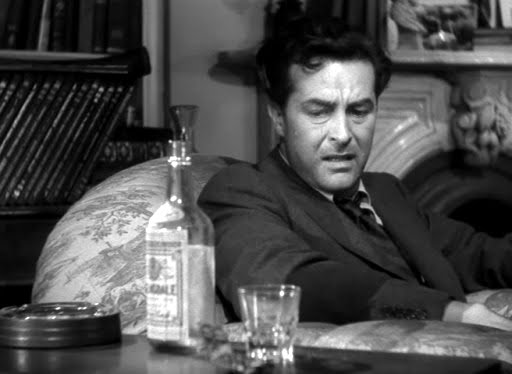It is perhaps hard to imagine today how edgy and depressing a movie like “The Lost Weekend” was in 1945. Ray Milland portrayed Don Birnam in an Oscar winning role that gave us the movie’s first drunk. Milland and Director Billy Wilder not only led this tough, gritty and realistic film to box office success but also to a Best Picture award.
“The Lost Weekend” was the first film to tackle alcoholism head-on, and it was a bold move for an audience that until then had wanted little more than to be entertained. Birnam is set to go on a detox weekend with his brother until he convinces his brother and girlfriend to delay the trip by a few hours. In that time, he scours his apartment for hidden booze and money so that he can get sloppy wasted. And after leaving more than a dozen “vicious circles” on a bar, he misses his train and is abandoned by his brother, his bartender and soon his girl. I imagined this would become a movie in which we watched a man go from bad to worse to rock bottom, but that comes later. The screenplay by Wilder and Charles Brackett actually devotes about a third of the film to developing Birnam as a writer, as a lover and as an amateur barfly.
It’s this segment that convinces me “The Lost Weekend” was okay to be made at all. Consider for a moment how this film would stand to achieve a seal of approval under the era’s Production Code. The Code forbid criminals to be glamorized or admired. The work-arounds for that however included (1) the addition of a morally opposite character that can set the character and audience right, (2) that the character learn his lesson and amend his ways or (3) that the character be punished.
“The Lost Weekend” wants to make clear that alcoholism is bad, bad, bad, and in that way it really becomes a morality picture. But the movie is a bit more complex than that. It wants us to feel bad for Birnam and hope that he can make it out okay, but he even says lines that make us want to sympathize with his habit. “It shrinks my liver, doesn’t it, Nat? It pickles my kidneys, yeah. But what it does to the mind? It tosses the sandbags overboard so the balloon can soar,” Birnam says to his bartender early in the film.
Of course audiences were applauding the acts of gangsters and gunslingers that did horrible things even under the code, but here is a film that actually gets us to momentarily understand alcoholism, to justify that maybe if he has that one drink he can overcome and write a memoir about his experiences. He explains that for some people, alcoholism is the need that one must at least have the option to drink. A half full bottle sitting on the shelf will do just fine, so long as he’s not cut off completely.
Although it ends up taking some truly dark turns that will turn anyone off the bottle, first a scene inside a rehab clinic where a man furiously paws at imaginary beetles in his sleep, then a scene where Birnam hallucinates a bat bloodily devouring a rat climbing out of the center of his wall. Yet amidst the depression and great suffering of this likable character, the audience remains hooked.
“The Lost Weekend” set the precedent for not just alcoholism movies (“Barfly,” “Leaving Las Vegas”) or addiction movies (“Sid and Nancy,” “Requiem for a Dream”) but also what you could arguably call today depressing Oscar bait movies. The Best Picture winners before 1945 were all romances, epics, biopics and inspirational comedies or musicals. Billy Wilder’s movie changed that, and in the next two years you had “The Best Years of Our Lives,” a movie that also included an alcoholic but focused on the recovery of World War II vets, and “Gentleman’s Agreement,” another morality picture about discrimination toward Jews in society.
It may be tough to draw a connection between “The Lost Weekend” and “Precious,” but both films have their heads, hearts and histories in the same place.
